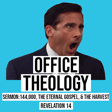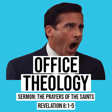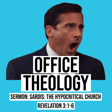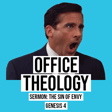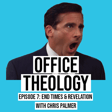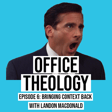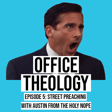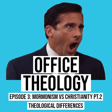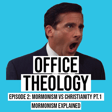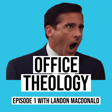Become a Creator today!Start creating today - Share your story with the world!
Start for free
00:00:00
00:00:01

Episode 4: The Doctrine of Hell (Conditionalism) with Josh from Sword & Pencil
In this episode, we tackle the hot take of The Doctrine of Hell. I am joined by my guest, Josh Nadeau of Sword and Pencil. Give him a follow on IG @swordandpencil.
This episode covers the 3 main takes on Hell: Eternal Conscious Torment, Annihilationism, & Christian Universalism. We break down what they are and where they come from.
Transcript
Introduction to Doctrine of Hell
00:00:00
Speaker
The reason why hell is such like an intense conversation to have is because it is literally the scariest thing you can imagine. And so oftentimes the people who, the majority, the traditionalist, the eternal conscious torment people, they'll accuse anyone who does not hold that view of making that decision emotionally.
00:00:22
Speaker
Welcome to Office Theology Podcast. Today we are tackling the hot take of the Doctrine of Hell. I'm super excited to introduce our guest.
Meet Josh: Sword and Pencil
00:00:32
Speaker
His name is Josh. You may know him as Sword and Pencil on Instagram. He has incredible artwork. I would say that the artwork is incredible, but you also post
00:00:43
Speaker
like things to think about underneath. And so it's not just your artwork, it's also the content that you bring that challenges us to think a little bit differently or expand our thoughts. So yeah, share a little bit more about kind of who you are and how you got to where you're at. Yeah, it's a pleasure to be here. Thanks for having me. My name is Josh. I started Sword and Pencil a few years ago. Like most things, you don't know why you start them. You just kind of do or you have like a baseline idea of kind of what you want.
00:01:13
Speaker
Um, and then with calling in general, you cultivate it. And so as time went on, I took the things that I cared about and loved and the things that seem to resonate with people. And then as I saw what the overlap of that was for like what people I perceived to need sort of pencil, as you know, it now was born. And so.
00:01:36
Speaker
Some of that is art, some of it is writing, some of it's speaking, stuff like this. It's just been a blast. It's just been so fun to watch it unfold for the past few years. Yeah, that's super cool. And you're writing a book too, right? Yeah, I am. I'm about halfway done. My manuscript is due in a few months and then... Okay.
00:01:58
Speaker
I can't share anything about it. My lips are sealed, lock and key. But I am so pumped. I send chapters as I've done them to my wife and she's like, okay, this is gonna be a doozy. And she's not just like, the best thing about my wife is she loves me, but she's not like a fangirl in the sense of like,
00:02:20
Speaker
there's tons of posts I make that she's like, I didn't read that one. And then, but if she so she's not like, just like, yeah, like running around the house screaming every time I walk in. Yeah, I'd probably say my wife's the same. She goes, Yeah, I really liked that one. I didn't think that was that good. I'm like, thanks. You got to get you a girl like that. Like, yeah, that's, they're the best. And so when she says, Yeah, this is really good. That means a lot to me. And so I'm getting more and more pumped as things go along. Cool.
00:02:50
Speaker
Yeah, so like you can't even share like what the topic is? Nope.
00:02:55
Speaker
Okay, great. It is it is like, the best thing I'll say is it takes like, two or three core sword and pencil ideas and just like, maximizes them. Great. So it's all the things I wish I could do that you could never do. And like a 30 second time thing or even a podcast like you just books, I do not care what anyone says we will need books, real books forever and ever. Yes. And so that's why I'm okay to write one because I think we still need them.
00:03:24
Speaker
Yeah. Yeah. And you can expound on thoughts a lot, a lot more than you probably could like, and even in conversation like this, like a book on the doctrine of hell is going to be significantly more intricate and longer than our conversation today. I've got suggestions even right here. Perfect.
00:03:42
Speaker
All right, well, thank you for sharing that. Yeah, we'll hop into the topic.
Three Main Views on Hell
00:03:46
Speaker
So if you are watching or listening, if you didn't know a while back, we did a hot take on the doctrine of hell and we pulled the three most popular takes, eternal conscious torment, or some people call it eternal conscious punishment.
00:03:53
Speaker
Yeah.
00:04:02
Speaker
Um, the second one was annihilationism or conditional immorality. And the third one was Christian universalism. Um, and so these results were, were kind of interesting to me, but if I'm honest, they didn't shock me a ton. Um, so eternal conscious torment was around 78% of people. And I think there's about three to 4,000 people that voted on these.
00:04:25
Speaker
And then annihilationism and conditional immorality is 14%. Christian universalism is 8%, which I will say I probably got in the most
00:04:36
Speaker
intense conversations with that 8%. Totally. And for Christian Universalism, they were pretty aggressive about their stance. And it was pretty wild. And so what I'm gonna have- What I'm glad about it. Exactly. So we'll have, before we break down kind of the results, can you teach and kind of expound on what each position is? And then later we'll jump into kind of where they got that from.
00:05:03
Speaker
Yeah, for sure. So I'll start with universalism. Universalism, broadly speaking, is the idea that everybody lives forever and then that the unsaved are going to be refined in hell and eventually one day reunited with God. So in that sense, hell is like temporary and serves as a place for restoration and rehabilitation.
00:05:31
Speaker
Right? So the big idea is hell is temporary. It's going to refine you, rehabilitate you. Everything will be subject to God and restored.
00:05:41
Speaker
Yeah. And that's interesting, though, real quick, because I just finished my Mormonism versus Christianity. And that's a lot of the view that Mormons, that LDS hold as well, that their quote, lowest level of the kingdom is restorative like that for post-mortem salvation. Yeah. Yeah. And there are like, there are
00:06:05
Speaker
You know, like without showing my hand too much quick, like where I land, I think there are some things that are more consistent with Christian universalism than the traditional eternal conscious torment view is the thing that is tough
Theological Consistency and Belief
00:06:19
Speaker
with hell. The thing that's tough with all doctrine and theology is just being consistent, right? It's not enough to have an idea or just like we were chatting about previous, like, Hey, this is what I was brought up with.
00:06:30
Speaker
It has to be like across the board, right? It can't be true just in these momentary spots. And so I started conversation a little while ago for like my subscribers, we're talking about
00:06:44
Speaker
Is it OK for Christians to smoke weed? And as you start getting into the discussion around what it means to be sober minded, that things really get intense because like the idea of sober mindedness, for example, has to be broad enough to say you're not sinning if you're so tired that your body is essentially drunk.
00:07:04
Speaker
Yeah. Right. Yeah. So you have to have like a robust enough idea that fits in scriptural categories and also still prohibits what scripture prohibits. And so when it comes to the doctrine of hell, consistency is key. That's like what changed my mind on tons of stuff. Okay.
00:07:24
Speaker
Yeah, so the next, the next definition is like the traditional list, the eternal consciousness torment. This is the idea that everyone lives forever, and that the unsaved will be eternally consciously punished in hell, which means hell is a permanent thing. Yes. Hell is a place of everlasting torment for body and soul. And the assumption
00:07:49
Speaker
that the traditionalist, that the person who holds eternal conscious torment holds, is that the soul is immortal. And it's the same assumption that the universalist makes. The last view is annihilationism or conditionalism. And it's the idea that not everybody lives forever.
00:08:11
Speaker
Immortality is a gift that is given to those who are in Jesus. And so it is the idea that the unsaved are punished and suffer for a finite time. And that results in like a permanent destruction. And there are varying degrees of that, right? Some people believe once you die, that's, or once you get to the second judgment, that's it.
00:08:32
Speaker
Some people believe that hell goes on for as long as it needs to till everyone suffers the appropriate amount of time. So in this sense, some people receive the gift of eternal life and
Eternal Conscious Torment and Annihilationism
00:08:47
Speaker
others don't. And then hell, death, Hades, the devil, they all receive the end of existence entirely. Yeah. They're annihilated.
00:08:59
Speaker
Yeah, completely. The full lightning bolt. Yeah, full Thanos on them. Yeah, they're gone. Yeah, so thank you for sharing that. Thanks for breaking it down. Where would people get their stances on this? So if I'm a Christian Universalist, where would I get this idea from?
00:09:24
Speaker
Okay, so there are like a few underlying things and it's probably best to start with the traditionalist view because it is the majority and then you can kind of see how things work.
00:09:40
Speaker
So this is for eternal conscious torment, right? Yeah, yeah. That's where we're starting. Yeah, we'll start there. So the idea with eternal conscious torment is like, essentially Augustine and Aquinas are like the main popularizers of theology in the West.
00:09:58
Speaker
And so what you end up having is, um, what's the best way of saying this? Augustine essentially is a Neoplatonist Christianized. So he looks, he says, I think it's in city of God. He says that the, uh, the Platonist way of looking at the world, we can Christianize it. And he's a couple of hundred years later. And so he's like, this is a great framework. We can Christianize it. We'll take the same assumptions and then we'll go from there.
00:10:28
Speaker
And with that comes this idea that the soul is immortal. And we can define all of that in a little bit. And so that means for Augustine, his baseline assumption
00:10:43
Speaker
are these neo-platonic assumptions that the soul is forever. And so when he reads the Bible, he sees hell and he just immediately interprets it as eternal conscious torment because the soul is immortal. Yeah. The universalist does the same, but when they read scripture, they assume
Universalism: Temporary Hell and Reconciliation
00:11:05
Speaker
the soul is immortal. It's going to go on forever.
00:11:08
Speaker
But they see certain passages that talk about everything being made subject to God that death and hell will be destroyed. There'll be no more. And they start saying, OK, if I'm going to be consistent across the board, that means people live forever. They will finally be made subject to God in a way and a restorative rehabilitative sense. Death and hell still need to be destroyed.
00:11:34
Speaker
But humans are made of the kind of stuff that goes on forever. Therefore, they're all going to end up in heaven. Does that make sense? Yeah, totally. And I would say real quick, I think the people that I've interacted with that would take the stance, they go, well, every knee will bow and every tongue shall confess that Jesus is Lord.
00:11:55
Speaker
And they go, if scripture tells us that confession and belief in Jesus is what saves you and faith in Him, then even if that is in Hell, someone will eventually confess, therefore they're not going to spend eternity there. And so it's like they, and then it's, I feel like they always kind of,
00:12:14
Speaker
propose a false dichotomy at sometimes, like at least the interactions I've had. Well, either Jesus's sacrifice was strong enough where it wasn't. And I'm like, you're just trying to make me pick what you want me to pick, you know? And so I feel like this angle really kind of
00:12:32
Speaker
does that and takes the power. Jesus is not defeated
Emotion in Theological Beliefs
00:12:36
Speaker
by our unbelief, which is sin. He died for all sin, which I feel like rabbit trails into a whole other conversation about unbelief and stuff like that. Don't apologize. I think that's great. I think you're right. One of the things that's tough, the reason why hell is such an intense
00:12:54
Speaker
conversation to have is because it is literally the scariest thing you can imagine. And so oftentimes the people who, the majority, the traditionalist, eternal conscious torment people, they'll accuse anyone who does not hold that view
00:13:09
Speaker
of making that decision emotionally and I don't I mean I didn't my journey into this was very theological I was doing my master's someone presented a paper on annihilation ism I took some notes I was working through my own stuff and then later on I was reading like Jonathan Edwards and Augustine and reading their conceptions of hell
00:13:30
Speaker
and having my own theological triggers be like, Hey, that doesn't seem to line up because this is worldview stuff. That's how we kind of put this together. But I also don't take the emotional thing as a pejorative. And so like, sometimes people will be like, Yeah, you made this decision based on emotions. It'd be like, Yeah, of course, like, if I'm saved, which I am, and if I believe that like, God is good and just like, and just what you have to believe
00:14:01
Speaker
For example, I like, I won't jump all the way ahead, but I've got quotes from like Jonathan Edwards and Augustine. Like some of their views for eternal conscious torment are like God works miracles.
00:14:14
Speaker
on the human body while people are alive and being tormented in hell so that they neither lose consciousness or whatever. Everything is just like God is continually acting miraculously on their life so that they always experience maximum pain. And that to me sounds like a pretty sadistic presupposition to make of
00:14:41
Speaker
an omnibenevolent God. Because there's a very drastic difference between, say, like a conditional immortality annihilationist view that says, if you want to reject divine life, I will let you reject divine life and let you go where that leads. And there is still active punishment. But it's very different to say for the rest of eternity, God is going to be enacting vengeance.
00:15:11
Speaker
Like, that's a very big presupposition to make. Yeah. And I think people clearly have emotional responses to that. And I don't think that's bad. Right. Like my kid doesn't listen to me. He's only nine months old. He doesn't listen to me now. Like I'm not going to beat the snot out of him for the next three weeks because of how much more I know than him and how much better. Of course, I'm a better person than he is in the sense of like, yeah, what I contribute to society, whatever. He's better than me and being cute and amazing and innocent.
00:15:39
Speaker
Whatever. I'm just smarter than him. Yeah, exactly. Yeah. Quick question though. So if I'm trying to listen, my wife always says before we jump onto these, Brennan, the words of Michael Scott explain this to me like I'm five. If I was thinking this and you said, okay, is God actively tormenting people or would it be them being handed over to the enemy who's also in hell?
Perspectives on Experiencing Hell
00:16:10
Speaker
Yes, so it depends on your view. But if you take the traditionalist view, well, most people would say that like, people's experience of hell is just their experience of God as like the as a consuming fire or as love. But it's just like, what happens, say,
00:16:36
Speaker
in the process of God making all things new and where you want to be. So I'm trying to think of like a decent analogy. But like, well, here's a bad one, but it's fine. Like pretend like you're a vegetarian or a vegan. Like you're a vegan, I'm not. And we go to a world class restaurant. And
00:16:56
Speaker
like a world-renowned chef cooks up like a perfect prime rib steak. For me, that's heaven. For you, that's hell. So lots of people have this idea that people are experiencing God, but it just depends on the perspective and what they long for, right? Like C.S. Lewis talks about that a ton, where like he says that Christians will say like, okay, yeah, like thy will be done.
00:17:23
Speaker
And so they follow God and then they experience fullness of life. And then there are people that God says to you, no, that's fine. I will be done. You are heading down the path to death and then you are experiencing what it means to be removed from me. Does that make sense? And so, yeah, wasn't that the great divorce? Yes. Great book. Such a good book. Yeah. Yeah. That's helpful. Thank you. Yeah, of course.
00:17:49
Speaker
Yeah, so if you want, we can get into like, because there are some overlaps, and then we can chat about, like, I'll just share where I land in the annihilationist camp. And so like, that there are these overlaps that each of the views have. So for example, like universalism and traditionalism or eternal conscious torment,
00:18:12
Speaker
They both agree that the soul is immortal and that means they disagree with annihilationism, which says that the soul is finite or is mortal. Universalism and annihilationism agree that suffering ends and evil is eradicated, right? So traditionalist, eternal consciousness, they believe that suffering goes on forever, evil goes on forever, death and destruction go on forever.
00:18:39
Speaker
And then lastly, annihilationism and eternal conscious torment, they agree. Because they say that the judgment is final and permanent. One is like you're experiencing conscious permanent punishment. The other one is you are experiencing just destruction. You cease to exist. Yes. Yeah. Yeah. Yeah.
00:19:01
Speaker
Yeah. So go ahead. I guess, um, maybe help us understand like how, how did you, you alluded to it a little bit earlier, but you read a paper that someone, uh, brought in.
Josh's Journey through Beliefs
00:19:12
Speaker
Yeah. And, uh, annihilationism. Yeah. So kind of share with us the journey. Cause were you more of an ECT type of person prior to this? Yeah, I was just brought up in that camp, right? Like I did.
00:19:25
Speaker
I just thought it's what everyone believes. It's what I heard like a Wanna. I don't know if you guys have a Wanna. Yeah, we do. Yeah, like youth group, all that stuff. It's what I just, I believe like, oh, when you die, you go to heaven, you go to hell. Hell is every nightmarish little thing people can share to scare the pants off, scare the Jesus into you and the pants off of you.
00:19:46
Speaker
And then when I was doing my masters in theology, one of my friends presented on annihilationism. He was an annihilationist. He tried to disprove it. And one of his points was saying annihilationism can't be true because the soul is immortal. And that was one of the notes that I took.
00:20:07
Speaker
And then once you start reading philosophy, not just like philosophy broadly, like Western philosophy, it was like this overlap for me of ancient Near Eastern biblical theology and what they believed and then reading broadly from a Western philosophical perspective.
00:20:27
Speaker
where I recognize that like those overlaps didn't exist the way that we tend to assume. So the big thing for me was like, what does the Bible assume about the soul? And not what Plato and Aristotle and whatever Westerns and I love Western philosophy and Western civilization, don't get me wrong. Well, like their presuppositions don't need to be correct. And so as I started going into that,
00:20:56
Speaker
that just started to like crack open just like the door a little bit, let a little bit of light shine in and I could just keep going through and try to map out what I thought. Yeah. That's good. Yeah. And that's, uh, it's interesting that he, so is he an annihilationist now or no? You know, I don't know. I haven't like, I graduated in 20, shoot, maybe 2014. So a long time ago, I haven't chat with him in ages. I should see if he has Instagram or something. Yeah. The seminar I went to,
00:21:27
Speaker
Yeah, go for it. No, you're good. Go ahead. I would say a seminar I went to had like the, so I started taking my master's when I was 22. And he started taking his master's, he was like 42. Because he's like, he was a dad, and he wanted to become a pastor and blah, blah, blah.
00:21:44
Speaker
And so we are like totally different areas of life. So now he'd be like mid fifties and be like, Hey man, are you still like, do you still think this is wrong? You'd be like, Josh, I haven't heard from you in ages. Yeah. Well, when you said, I wonder if he has Instagram, my, my first thought was, yeah, of course he does. But now you said that I'm like, well, maybe not. Yeah, man. Maybe not. Boomers just had Facebook. Yeah. A hundred percent. You'd find them on there for sure. Posting in, uh,
00:22:07
Speaker
in all sorts of fun groups there. All sorts of forums. Yeah. And so like the big thing for me was the immortality of the soul. And I don't mind like working through that with you to like, I think it's a really cool, like for me, it's cool. Yeah.
00:22:26
Speaker
They're like three main things that make up the, like when we're discussing the immortality of the soul, what people are talking about. They're talking about the persistence of the soul, the internal subsistence of the soul, and then the external resistance of the soul. And so like we can define all those things. So persistence just means that the soul persists forever. It's immortal, right? It's made of the kind of stuff that's going to go on.
00:22:56
Speaker
by internal subsistence, which is, again, like scholars just don't know how to sound cool. They just like use big words all the time. And so like that just means that the soul, because God made it, has this innate ability to persist in and of itself. Right. So it's like by left to itself after God has made it left to itself. A soul is made out of the kind of stuff that is going to keep on going like energize or battery to the max. Let's keep going.
00:23:25
Speaker
And then the last one, the external resistance, that just means like the soul is indestructible. So when someone is talking about the immortality of the soul, they're saying that the soul is made up of the kind of stuff that is impervious to like external elements and forces. So even if Thanos gave the snap or even if like, it doesn't matter what it is, it is made out of the kind of stuff that cannot be destroyed. So in the Christian doctrine, immortality of the soul gets a little bit broader.
00:23:55
Speaker
And we'll say like God fully intends souls to last forever and therefore makes them out of the stuff that will be indestructible and everlasting. And they exist in their own steam because of like whatever God makes can't be destroyed. That's the assumption. Now, I don't think that's actually what the Bible teaches personally. Yeah.
00:24:19
Speaker
I think that the Bible sets out a view like we can work through like some of the here's what we can do like I don't mind just like going crazy we can work through like the biblical narrative like what is the meta narrative of Scripture and how do humans fit into that.
00:24:36
Speaker
We can look at some passages that talk about like where immortality comes from that we can work. I saw on the show notes, there's like tons of problem passages. Yeah. We can work through some of those problem passages. We can just see the whole shebang. Let's do it. Let's go for it. Awesome. Yeah. Break in whenever you want. And then I can just, I'll answer whenever. Great. Sounds good.
00:24:57
Speaker
So I don't think that the Bible teaches that the soul is immortal. I think that is, like I said, previous, like a Neoplatonic Augustinian presupposition that, again, that makes me sound like a bit of a jerk to say it that way.
00:25:13
Speaker
But it's just like Augustine lives in a world, right? Like it would be the same as any one of us reading the scriptures being 3000 years removed from when these were first written and just assuming we have the same ideas of every single word and concept. So Augustine had a lens. He used it. I think it's the wrong lens. And so
00:25:36
Speaker
If we want to build up what I believe is the biblical lens, I think we have to start with like the narrative of scripture. So in the beginning, God makes humanity and God makes them of the dust. And from the Bible's perspective, this isn't like a chemistry lesson. God isn't saying that we are biologically, fundamentally dust.
00:25:59
Speaker
God is saying that humans are of the earth that we are we are created. God is not created. We are human and mortal. Right? Dust is not whatever that's being contrasted with with God.
00:26:14
Speaker
So Garden of Eden is a place that humanity enjoys this close relationship with God, and humanity is commissioned to bring the beauty of Eden to the rest of the cosmos. And so part of what that blessing is,
00:26:31
Speaker
is this relationship and freedom to eat from the tree of life, right? And so this is like part and parcel of whatever the author of the first 11 chapters of Genesis is trying to say is that wrapped up in what it means to be human is this mortality. We're of the dust, but then we're also like animated by God.
00:26:55
Speaker
And we are invited to share God's rule with the rest of the cosmos, but then also partake in the tree of life. So if we want to understand what the tree of life is, we're lucky. There's a bit of context in those first three chapters. And some of the context is just knowing what happens if you eat from the tree of knowledge of good and evil.
00:27:15
Speaker
And the text says they would die. And the best rendering of that phrase is not like you die that second, like the Zeus lightning bolt. Yeah, the best rendering of that is the like you're doomed to die. Sort of like if you eat too much ice cream, you are doomed to get fat, right? It's like inevitable.
00:27:34
Speaker
Yes, that's the trajectory of doing this. Yes, this is what is going to happen. And essentially, like if you want to pick out the language, because that's like, it's so key to understanding our scripture is in Genesis chapter three, 19, from dust, you are made to dust, you shall return.
00:27:51
Speaker
Yeah, so like that's key and then we get another insight to what the tree of life is when we look at Genesis 3 22 and 23 Where God blocks the entrance back into Eden with an angel and says yep, man has become like one of us And we he can't be allowed to reach out and
00:28:09
Speaker
take from the tree of life eat it and live forever and so if we take those verses and just begin to assess them in my mind it comes it becomes pretty clear that the consequences of sin is death and that is legitimate death um ceasing to exist altogether is what you're saying right exactly yeah and i think so i think that's what the scripture is continue to build upon okay um
00:28:35
Speaker
And that if we are going to live forever, we depend on God. Right. So I think that like Romans three and five bears us out, the wages of sin is death. And so it seems like for me, when I put my Bible together, the tree of life is what gave immortality and ultimately God is the one who gives life.
00:28:58
Speaker
It's not something that man has his own. It was a gift from God and that makes sense in my mind with the rest of the Bible. So I think Genesis spells out the nature of humanity, at least a part of it. Who we are is dust, immortal, immortality, the living forever. All of that stuff comes with this right relationship with God and partaking in his life, right? What do you think?
00:29:23
Speaker
Yes. That was a lot, but it was good. I think, I think the piece that's interesting is, um, kind of analyzing the creation of Adam and Eve, totally how they're, like you said, they're created from the desk. I've read that hundreds of times, but really kind of assessing what, what isn't, not only is what God doing, like in creating people in his image.
00:29:53
Speaker
but how is he creating them and what is he creating them of? I don't know if I've ever really asked myself that question, like, oh cool, God created mankind, created from the dwelling. Great, but I don't know if I've ever stopped and be like, what's the significance of being created from dust? You know what I mean? If I'm honest, I don't know if I've ever really thought that question. Yeah, because it's a big question and oftentimes depending on the camps you end up in, we turn it into a science
00:30:23
Speaker
Seminar where like being made of dust is like oh god saying that we're made of carbon and we're made of nitrogen and we're made in this like no That's not what God's saying. What God's saying is like we are made of earthly material finite mortal stuff and he animates us by his spirit and if
00:30:41
Speaker
humanity sins and eats from the tree of knowledge of good and evil from dust you are made to dust you will return you are rejecting God's life you are rejecting all of those things and so those are like pretty powerful things and then yeah yeah well I it's tough because I feel like I have questions that's gonna lead to
00:31:03
Speaker
all down these these other roads because it's like you can do it like take um I know like someone was like poetry and stuff like that but like yeah the expressions of like
00:31:15
Speaker
You're like, you knew me, like you for me and my mother's womb before the, or then later in scripture, before the foundation of the earth. You know what I mean? Like all of these, it's speaking to this intimacy that God has with us. But, um, at some level you're, you're pro you're watching me process real time. That's great. I love it. But it's like thinking like, huh?
00:31:43
Speaker
Cause I grew up in the ECT camp and I would probably say that's probably more where I lean and I can look to some different scriptures that we'll talk about a little bit later. Yeah. But I think as I was doing this and even reading some of your stuff, I'm like, I'm not like totally like opposed to this. You know what I mean? I'm opposed to Christian Universalism for sure. Yeah. But it's like, I can kind of see how people get there, you know? Um, I guess I'm just, I'm just processing some thinking of all these other scriptures that kind of speak to this. Yeah.
00:32:13
Speaker
Yes. Yeah. Do you kind of get what I'm referencing? I know exactly what you're saying. And so like this is again the part where like the consistency and foundations and worldview matter, right? Because all of us are coming to scripture, which is the data.
00:32:28
Speaker
It's all the same data and tons of people are ending up in different spaces. And so we can ask why, why is it that someone can read the first 11 chapters of Genesis and they think it's like an old earth or a young earth or it's mythological or it's like scientific history or whatever. It's because we have underlying presuppositions that inform how we read a text.
00:32:51
Speaker
And for the most part. You referenced this earlier as lenses, like Augustine has a lens to interpret things. And that's where you said, I feel like the lens, you read these passages through a different lens than he does. Yes. Okay. And I think that the biggest way, like, so the lens that we have to put on, because we are not the primary readers of the text in the sense of like, it wasn't written to us immediately, but we do get to participate in it.
00:33:20
Speaker
Yeah, and so like we are just so far removed like dude you you make memes You know this like so deep if like if I ghosted and went off Instagram for a month or two
00:33:32
Speaker
There would be so many new meme formats that I, that's just a month in the modern world that I'd be like, what the heck are people even saying? I don't get this. If you take that and you stretch it across 3000 years and across an ocean and like across technological boundaries, like we're talking a different language. And so we all have these frameworks and lenses and essentially what we want to do is remove as many of them as possible.
00:34:00
Speaker
So we can see the Bible clearly the way that the original authors intended and the way that the original readers would have understood. Yeah. How, okay, I'm gonna go down this road. How would someone go about removing those lenses that they have? Yeah. In a way that is still honoring to the text. Yeah. Podcasts like this are great. Like honestly, there's no shortcut for study. And so
00:34:30
Speaker
For me, like I was brought up as a Christian, I was brought up Reformed Baptist, I'm neither of those things now. And then I went to a Reformed Baptist Seminary. And there's just nothing that has been like, I've spent 20, so I have my masters. I was catechized growing up. And then I did my masters over a couple of years. And then since then, it's like, this is all I do. Yeah, like, there's just no shortcut for like reading 1000 page books on the topic.
00:34:59
Speaker
But I realize not everyone can do this. And so there are beautiful places and spaces online, whether you agree with them or not, like that's not the goal. The goal is not to just find people you agree with. The goal is to do what you're doing. Find people who are asking questions, who are being genuine, who actually want to lead you into truth. And just see if you agree. Why or why not? And your answer can't be, I agree because my daddy's, daddy's pastor told him this 30 years ago, and this is just what we all believe.
00:35:29
Speaker
Yeah. Or I saw this reel on Instagram. Yeah. Yeah. If that's ever your answer, like, and it's not one of mine, then you can go away. Yeah. It's not one of mine. Exactly. Well, it's, it's interesting because when I think about this topic of like removing, um, filters, the reality is it's almost kind of like, feels like.
00:35:53
Speaker
you remove a filter with a current filter in place at the same time. Does that get what I'm saying by that? Oh yeah. Like if I'm trying to figure out where I land on the doctrine of hell, whether I like it or not, I'm trying to
00:36:10
Speaker
remove filters to hopefully at some levels consciously or subconsciously with the one that I agree the most with and or and or feel the most comfortable with. Yeah. And so that's, that's the part that I think is tricky. And this can go into a whole topic of deconstruction, but we won't go down that road right now. But it's like,
00:36:31
Speaker
how do I stay faithful to the text if I'm unsure of what the original filter should look like on that text? Totally. For me, like my story, we don't need to go all the way into deconstruction stuff, but I just remember one of the baseline assumptions that I made when I went to university, I just asked two major
Foundation of Faith: Resurrection and Truth
00:36:55
Speaker
questions. The first one was like, did Jesus rise from the dead?
00:36:58
Speaker
If he resurrected, if he didn't, the Bible says the intrigue can be merry because tomorrow you're toast anyways. And so I took a year to figure that out on my own. And then the second thing I did was like took a year to figure out if the Bible is true, because I was like, even if Jesus rose from the dead, if the Bible is not legit, whatever capacity that I can do whatever I want anyways, because no one can tell me what God said.
00:37:21
Speaker
And once I was convinced of those two things, then my whole deconstruction reconstruction journey was based on the resurrection and that the Bible in some capacity is ultimate truth or a form of ultimate truth. Like tradition for me is a part of what that looks like. And so I think that depending on where people are coming from, deconstruction is legitimate if people are doing it for legitimate reasons. Like I always tell people
00:37:49
Speaker
If you want to deconstruct to get out, just leave. No one's going to fight to keep you in. Just be honest with yourself. You don't need to be afraid. But if you're going to deconstruct in order to see, hey, I want to find out what's true, then make that the baseline assumption and be like, hey, if you have to go all the way back to, do I think the Bible is true? You go there and we'll chat. That's fine. Yeah. I love how you said that. If you want to leave, just leave.
00:38:16
Speaker
But people might be like, well, I need to invalidate it to confirm my reason for leaving. You know, but I think at the end of the day, if you're just trying to I think that word deconstruct is such a hot button topic. Now, like you say it like right wing people are like, oh, you super liberal. You know, it's just like it's been politicized. It's been abused. And but what you're saying is like I'm going back
00:38:42
Speaker
to scripture and allowing scripture to define the things that I believe, not what I've just been told by my great, great grandfather's brother's pastor, you know, totally. And go ahead. Yeah, I was just saying that's like, that's one of the key things where it doesn't matter what, like, and I'll just be as broad as possible. It doesn't matter what anyone believes about the book.
00:39:07
Speaker
it is the central book of Christianity. And so if you want to know what Christians believe, then you take the book as authoritative because that's what we believe is authoritative. And so you don't need to agree with that. Like there are great scholars I read who are not Christians and they do great work because they just say like, this is what Christians believe. And they're like, yeah, I don't believe it. I'm like, I do. That's actually pretty good scholarship. And I'm taking notes. And so
00:39:33
Speaker
When we want to do the work of like, what is the Bible actually saying on its own terms? There are many levels we do that with. Um, but there are like books that can get you into not just what history and tradition has talked about. There are books on certain topics that can get you into like what the ancient near Eastern conception of like a seven day creation is. Um, but the ancient near Eastern conception of the soul is what Shayal is. You know what I mean?
00:40:03
Speaker
All of these things require study and the study is worth it. Like I'm telling you as a person who could, and like even if your gateway in is like the Bible project, I love those videos and like, I don't agree with everything they say, it's fine. But if someone like interacted with those videos and their podcasts, you're going to get exposed to a ton that will allow you to go deep.
00:40:28
Speaker
And books beat those every time. The videos are beautiful. But books will just take you on this journey. And if you're open, you get to experience and think through and process. And that's how we come to scripture more clearly. Yeah. And that's super good. I think what you were saying about a lot of this just takes time. And I think that our current culture doesn't like to take time on stuff anymore.
00:40:56
Speaker
It's like I, I want to know right now and I want to find the most succinct way to do this so that way I can have a stance at some level on this, not realizing the person that they're listening to and or reading probably spent years, maybe decades getting to the spot that they're in. Um, and so I think at some level, I love what you said. It's kind of a lost art, uh, to say two things. I don't know. And I'm learning slowly. Like, Oh man.
00:41:25
Speaker
Like those two things are really freeing actually, because especially in the world of competition on internet and posting stuff and rebutting with people, like you feel like you have to be an expert in everything. And the reality is we're not know if someone says they're an expert in everything, they're straight lying to you. They're not.
00:41:41
Speaker
But it is selling something exactly and so it's just the it's learning the discipline of slowing down saying i don't know and taking time to learn things. Yeah and doing what you're doing is like learning ask real questions right and so.
00:41:59
Speaker
I think you are 100% correct. Saying I don't know and saying I'm learning, those are the first steps into finding anything out. To bastardize one of Jesus's parables when he says, I've come to heal the sick. Those people who are well don't need a doctor. Be like, listen, I'm sick. I don't know things. I need knowledge. If we are so arrogant to assume that we have everything figured out,
00:42:27
Speaker
We just cut ourselves out from enjoying truth. And like God, Jesus is the way, the truth and the life. And so like, why would you rob yourself of trying to be in the truth? Yeah. That's good. I don't even know how we got here, but it's a great conversation. It's good. We're talking about filters. Yeah. Yeah. Oh yeah. And so some of the questions that got me like to, to circle into the questions of like, what are the honest questions I kept asking myself was like,
00:42:56
Speaker
Not just like, okay, I read these Old Testament scholars who talk about like, from dust your mate to dust your return, the difference of the tree of life and the tree of knowledge of good and evil. My next questions were like, does the rest of the Bible teach this, right? Does the rest of the Bible teach that man is inherently immortal or that he's mortal and needs immortality as a gift?
00:43:19
Speaker
And I'll just read two verses or two little sections. We could go really deep, but like essentially then that's just like a Bible study. Yeah. We might start losing people if we pass the hour, hour 15 mark. Right. I'll be as charming as I can. Yeah, there you go. And so the two main verses are like, or passages are 1 Timothy 6, 15 and 16, which just says God is the blessed and only ruler, king of kings, Lord of lords,
00:43:48
Speaker
who alone is immortal and who lives in unapproachable light whom no one has seen or can see. And then, so that is saying only God has immortality. He alone is immortal. And then the second passage from 2 Timothy chapter 1 says that God has saved us, called us to a holy life, not because of anything that we've done, saying that this grace was given
00:44:15
Speaker
uh us in christ jesus before the beginning of time now has been revealed through the appearing of our savior who has destroyed death and brought life and immortality and light through the gospel so it looks like immortality is a blessing and promise of the gospel okay so when i saw those two passages i was like oh okay i mean there's tons more yeah but like i was like oh okay um
00:44:41
Speaker
there we go. This is a straight line, right? Humans are mortal. God gives immortality as a gift for following him. You partake in his life. Yeah. And I think a point of clarity, so annihilationists, you would say that it's not that there isn't a hell, it just has an expiration date, for lack of better words.
Punishment and Afterlife States
00:44:59
Speaker
Yeah, exactly. So that's my take. There's some people who will say,
00:45:03
Speaker
Um, there is no hell that once you die, the separation you experienced before the final judgment is like your hell and that the final judgment God annihilates and destroys everything. But most annihilationists say after the final judgment, God, you experienced some sort of finite punishment for the deeds that you've done.
00:45:26
Speaker
And it varies. Would that be tied to because since you are mortal and not immortal, your punishment can only go for for so long because a mortal body can only receive so much punishment. Exactly. Would it pair like that? Exactly. And so essentially, depending on where people land is God will make people endure in the sense of like he will
00:45:55
Speaker
What's the best way of saying it? It's not like an active thing, but it's saying like people will get like their fullness of what they deserve. So like, I, for example, think that like, to what it's Godwin's law, it's only inevitable before someone brings up Hitler, Hitler is going to suffer differently than like, yeah, some normie who didn't kill 6 million people, but still denied.
00:46:21
Speaker
Jesus. Exactly. Yeah. And so like that difference is just just and it's normal. And I don't know what the length of time will look like. We're not told those things. I just don't know. It's like, is it a week? Is it a month? Is it 10,000 years? Like nobody knows. Yeah. But there is this finite time. So yeah.
00:46:39
Speaker
And then once everything's done, God destroys death and hell and Hades, and there's no more sin-death destruction left in the universe. Yeah. Yeah. All right. Man, that was super helpful.
00:46:53
Speaker
Cool. We're going to jump into, I want to ask some of these general questions and then I want to ask, as you can see in there, like a pastoral question because there's a lot of people that you said, they have anxiety about how, like this whole topic and they avoid it because they don't know what to do with it or how to wrestle with it. So I want to ask some general questions that people sent in, but also maybe just we'll address it maybe from a pastoral perspective.
00:47:22
Speaker
shepherding perspective as well. 100%. So the first question is, are people in heaven and hell now or are they in waiting? Yeah, so there are people who have different views on this, obviously, like people have different views on everything. So there's some people who believe like your soul, like you there's soul sleep, which is like this idea that you die and your soul takes a catches 40 winks until like the final judgment.
00:47:51
Speaker
And it'll feel like a blink to them, essentially. Yes. It'll feel like a blink. God rings the cosmic alarm bell, the trumpet, and then, um, everyone wakes up for judgment. I don't think that's true. Yeah. Is the trumpet careless whisper? Probably. Sorry. Keep going. Yeah. Uh, I don't hold to that personally. I think that, um, when we die, our soul is separated from the body and that's why like, it's not the fullness of time. I think like.
00:48:22
Speaker
The resurrection of the body is what people are longing for. And so when I try to put scripture together and be consistent, I think our souls are either present with God in some capacity or they're not present with God in some capacity. And, um, so like people want to call that an intermediate state. That's fine. Like I don't, I don't really care what people call it. Um,
00:48:45
Speaker
The idea would be that we have in the book of Revelation, there are saints, we're surrounded by a great cloud of witnesses. There are saints who are pouring out prayers before the throne of God. Like they're not asleep. They're not like sleep talking, they're awake, but they're disembodied. Like they're not in their resurrected bodies. And then we have other passages of scripture that talk about like some people are separated from God. They are not embodied in that place of separation. They are,
00:49:13
Speaker
still disembodied in their souls. So they're not even fully human right then. Yeah. Yeah. And so, I mean, a couple passages come up. So, uh, John 11 with Lazarus when they're like, we know he's not dead. He'll raise again on the last day when everybody like, so what would you say to the person says, well, what about that passage? Yeah. So they're like these transitionary periods. So like you have the old Testament that exclusively talks about shale, which is talks about the grave. So the grave is the realm of the dead.
00:49:42
Speaker
And in the Old Testament, everyone went to the grave. David went to the grave. Evil doers went to the grave. Everyone's in the grave. When Jesus comes, his parables start to elucidate more about what the supernatural reality is like. But one of the main conceptions where things change,
00:50:06
Speaker
is the death and resurrection. So you have this like period of time where pre-death resurrection people, their conception of what life is, you have like Jews who believe like oh in Abraham's bosom or whatever. At the death and resurrection of Jesus like the Eastern Orthodox believe in like the harrowing of hell where Jesus descends. I'm going to be posting about this soon where like Jesus goes
00:50:36
Speaker
he descends into hell and he liberates people from the realm of the dead. And then he brings them to this disembodied heaven. And I believe that I think that's what happens. And so I think that before, yeah, go for it. Sorry. And would that be like what is talked about in first Peter three, like when he's referencing, like in this time he went down and so descended into that was one of the questions you can see on the show notes, like,
00:51:03
Speaker
Did you just preach in hell or where did he go? Yeah, that's what I believe. And I think it's just the most consistent. So like Peter talks about going to Tartarus, which is like the
00:51:14
Speaker
their conception of hell, real hell. And I think what the Eastern Orthodox believe is like legit, it's really good. So it's kind of like, this all depends on your view of the atonement too, but in my mind, it's like divine espionage where Jesus, like he tricks the devil into letting him into the realm of the dead. And then he goes and kicks butt and liberates all people who are righteous from the realm of the dead, from the grave.
00:51:43
Speaker
Yeah. And he brings them to himself. And so then I got goosebumps a little bit because that's just so awesome. And like then the now the conception is post resurrection, when people die, they are either going to be present with God in some capacity, not fullness or present in that realm of the dead. And again, not fullness, it will get worse or it will get better. Yeah.
00:52:12
Speaker
Dude, you're taking us to school and I'm here for it. Yeah, I love it. I love it. This is my jam, man. No, I love it. I'm, I'm glad cause I'm like, honestly, like in this topic, I enjoy it and I've studied it a little, like a bit, but not like, I have not, I have not done a lot of work, kind of what we were talking about earlier. Yeah. It just takes time. Yep. That's right. And I just have to be okay with that. It's okay to say, I don't know.
00:52:37
Speaker
I don't know. Exactly. Then we have a conversation like this and it's just like, okay, this is cool. Yeah, absolutely. Um, so what do we do, uh, with like all the parables that Jesus talks about? Like when he, cause I feel like he talks about separation, weeping and gnashing of teeth, like all that stuff, a decent amount. He does a ton. He talks more about health than anyone. And so there are like quote unquote problem passages for my view.
00:53:07
Speaker
And some of them are like the places where like Jesus talks about heaven and hell and the language that he uses. There are other passages like so like Jesus says like the worm does not die. Pardon me, fire's not quenched. There's tons of stuff. Yeah. And we don't have the time to go into like all of the Old Testament passages where those come from. But ultimately,
00:53:30
Speaker
what we're trying to do is be consistent. And so one of the major ones, for example, is in Revelation, where it talks about like the smoke of torment rising forever. Yep. And that 1416, I think. Yeah,
Symbolism and Interpretation in Revelation
00:53:42
Speaker
1416. And maybe a little bit in 20. There's something in 20. Yeah, the second death and all that stuff. Yes. Yeah. And so there are Old Testament passages that john is quoting from.
00:53:57
Speaker
And those passages themselves are using destruction in Genesis as a metaphor and symbol. Sometimes you have like the smoke is rising from Sodom and Gomorrah, but it'll call it Edom. And it's saying it's still rising today. And this is Isaiah or Ezekiel writing about it. And you're like,
00:54:17
Speaker
it's clearly not still rising today, but the consequences are still in effect today. And so when you try to put the passage together, you say like, what is the artist? What is the prophet? What is the person doing the writing trying to communicate? You say the destruction is so complete that the effects are still ongoing. And it's really not just the physicality where the smoke is still rising up. You would just like, so if I wanted to say like,
00:54:48
Speaker
We partied super hard last night. We were laughing so hard, whatever, like not drinking, not buzz, not whatever, just doing our thing. We're laughing so hard. We'd say like we split our sides or whatever, right? That's like a figure speech. We're like, no, I didn't legit split my side. I didn't need to go to the hospital, but I'm trying to communicate that I was like so over the top laughing.
00:55:11
Speaker
And I think that's what like, so in Revelation, John is picking up, I think the same seeds of symbolic language saying the destruction. You've heard it said like, this is what the destruction was like in the Old Testament. It's bigger and more intense here in the New Testament.
00:55:30
Speaker
But it's still the same framework. John isn't twisting the meaning to say, oh, no, no, the smoke is kicking back up, and it's real smoke now. Does that make sense? Yeah. No, that makes perfect sense. I get what you're saying. When Jesus starts talking about stuff like this, then I think we have to have that same framework.
00:55:51
Speaker
Yeah. What would you say to the Luke 16 passage about the rich man and Lazarus when he's like, just tell him to dip his finger in the water so I can have some sort of relief. Yeah. Um, so parables are tough. Um, so my buddy did his, um, paper on annihilationism and I did my paper on interpreting the parables.
00:56:15
Speaker
The parables are really tough to derive theology from because if we push them too far, they break. They're just like stories, they're analogies, right? Like if we push anything too far, it's going to snap.
00:56:31
Speaker
So Roman Catholics believe in purgatory, Eastern Orthodox believe that the soul lingers in some capacity after death in the sense that there is the valley of the toll houses. If you don't know what that is, we don't need to get into it. And so there's just all these different conceptions.
00:56:48
Speaker
And so I personally don't think that we're going to see conversations like that as like the normal MO. But I do think we have places in scripture that like kind of throw us for a loop where like Samuel's ghost appears to Saul in the Old Testament. We're like, what?
00:57:12
Speaker
This shatters a lot of my thoughts that I have about this. Yes. Yeah. And so like that kind of stuff, I personally don't think that, for example, that is going to happen super often, but I do think, and I'm working through lots of church fathers, lots of people in the tradition, they have said that there is a point to praying for the dead.
00:57:39
Speaker
And it goes against like a lot of my Protestant upbringing sensibilities, but it's just a question interact with, right? And so there are, there are just things where if I want to be consistent across the board and Samuel's ghost pops up and you have the Richmond and Lazarus and you have a couple of passages, be like, okay, does how I answer put them together well and perfectly? No, currently right now it doesn't. And so I want to, that's what's one of the things I'm reading about. Yeah.
00:58:08
Speaker
Interesting. Thank you. It's a tricky one. Oh, for sure. And I, and I, and I think that's kind of a lot. I got asked that one a lot of like, what about this, this parable and parables are tricky. Cause it's like, and it's, it goes back to that filter conversation though, too.
00:58:28
Speaker
Like I'm going to read and interpret parables with whatever filter I have in place that lines up, whether consciously or subconsciously with what I believe most. And so it's, and that's just the tricky, but honestly, that's what I love about like studying and reading and spending time with the Lord is like,
00:58:51
Speaker
the challenging of why I think the way that I do, not so far as in where I completely lose my faith, that's not what I'm saying, but in the sense of like, why do I believe that? Is it because I am uncomfortable to think otherwise? Or does it feel like I'm abandoning my faith if I think otherwise? Well, then if I feel that way, why won't I think about that? Is my faith so insecure that I can't ask questions?
00:59:15
Speaker
Right. No, no, that's huge. And I think that like the courage to ask a good question, that's the hardest part. There's a philosopher I really love. And he says the hardest thing is finding the right questions. The easy part is answering them, but like having the courage to ask the right question is really big because we all have questions, right? Like I remember growing up, I mean, I'm a man, obviously being like, Oh man, like what happens if like I, if I, if Jesus comes back before I have sex?
00:59:44
Speaker
I'd be like, no one talks about it, but we all think about it. And so I wanted to know the answer to the question, will there be sex in heaven? And so I studied it. And I have a great answer to it. But we have to be courageous enough to be like, yeah, I'm going to ask the question. And some of it is like,
01:00:04
Speaker
Are there ghosts? That's a big one. Are there ghosts? That's a hard question. If we don't answer it well. So I was writing the other day and I think it's way more honorable. I think God will be way more pleased with us if we do our best to find the truth and we're not right.
Seeking Truth and Understanding Hell
01:00:25
Speaker
then if we maybe get lucky and are right, but we just agree with what someone else told us to believe, I think there's no honor in that, right? Be like, Hey, marry this girl. Yeah. Okay. Yeah. Hey, go do this. Yeah. Okay. But if you deliberately decide to be after something and live for it, that's way better. I'm way different. Yeah. Cause there's that a sense of effort. And I think even like, uh,
01:00:48
Speaker
I mean, cause that could be fear based as well. Cause you have the, the parable of, um, the King, um, and trusting his money to certain servants, the one that buried it, that, that didn't really do much just got roasted. Like you wicked servant. And I'm like, that's a strong words. Yeah. Sorry. The preacher is coming out in me right now. Yeah. I love it. Um, so last question I want to ask, we're going to zoom out from being in all these doctrinal or theological conversations.
01:01:18
Speaker
Just as like a Christian, how should the doctrine of hell impact your life, our lives? Yeah. I mean, obviously hell is big and scary. And it's like the, I was out for drinks. This is a while ago with one of the guys from the climbing gym.
01:01:36
Speaker
And he asked me, he's like, what are the two most archaic things you believe being a Christian? Because we were just chatting, and then he knew I was a Christian. What a great question. Yeah, he was a great guy. And I was like, hey, here's two, one of them that hell's real. And number two, sex before marriage is bad. I was like, those are the two things I wish I didn't have to believe living in the 21st century.
01:01:57
Speaker
But I do because I'm convinced that it's legit and so like hell is one of those ones that like feels archaic and it also feels crazy because of the culture that we currently live in which is Like there's two sides to this we are so far removed knock on wood from like war and destruction and death and evil yeah that we can't conceptualize that
01:02:25
Speaker
it would take a force of good to destroy evil. That's so far removed from us, right? And then the second thing that we're so far removed from is we just live in a very lenient, tolerant, castrated,
01:02:45
Speaker
world, unconditional love has been castrated. It is a shell of what is intended to be. We think that unconditional love means by the standards of our modern time, Jesus would never preach the Sermon on the Mount because it's not unconditional because he demands so much from us.
01:03:04
Speaker
And so when those two things pop up and you start talking about hell, it becomes very taboo and archaic because we say like, yeah, there's evil and there's consequences for the stuff you do that's wrong. And number two, when you reject life, you are on the path to death. Those are hard things to say in a modern world.
01:03:26
Speaker
And this is the hardest thing for like Christians have to talk about because if you're not on if you're not on the inside then you're on the outside You don't go to the good place you go to the bad place and to say that verbatim to someone What do you think if I reject Jesus be like, okay, this is like what Christians believe It's not fun. Yeah, and so like the first step pastorally is to I think because for me
01:03:51
Speaker
It doesn't look like this online because you guys interact with me just through a screen and you see all the Christian stuff I do, but like the majority of my friends are not Christian. The majority of the world I live in is not Christian. And when I talk to people about stuff, these are the kinds of conversations I want to have and I want to have them in a way that is still good and true and beautiful. And so when I talk about hell and people ask, I recognize they're asking questions about like,
01:04:19
Speaker
Who am I as a person? And whether or not like God exists or not, like am I good? That's the biggest pastoral question. And I tell them pretty often, I'm like, listen, like hell's a big scary doctrine and just the ideas of it, you can strum in it, be like, how can you believe in a good God? Blah, blah, blah. We can do philosophical stuff all you want. But ultimately it feels like to me,
01:04:43
Speaker
Like what you're asking is like, what's goodness? Am I good? What's a standard of goodness? Like who am I as a person? And so pastorally, I guess initially my big thing when I talk about hell is to recognize like, yeah, it's real scary. Number two, most people when they wanna talk, they wanna talk about goodness. They wanna talk about virtue. They wanna talk about where they land.
01:05:11
Speaker
Not necessarily in like in regards to hell, but they want to be like, if you ask someone like, Hey, like, are you a good person and be like, well, um, I'm not Hitler. I'm not whoever I'm doing. Okay. Hey, are we really though? Yeah. Um, I think that's the major one. I think the other ones are just like, I think hell is an invitation from the other way.
01:05:35
Speaker
to live in life. And so you can, one of the things that I do for myself is to say, um, if I want to have the best marriage possible, what are the things I can do? And I'll be like, I should do this. I just do this. I do this. And then I say, what are my worst traits and my biggest temptations? What would happen if I let those run rampant? If I let like my tendency to drink too much or get too angry or be apathetic, what happens if I let those go unchecked?
01:06:04
Speaker
for 10 years. Yeah, this is pre marital advice to in marital advice at the same time. Yeah, I would like I would blow my marriage to smithereens. Yeah, I think I think hell is the same thing. Be like, Listen, if you keep choosing death,
01:06:18
Speaker
over and over and over and over again. You will get death. Yeah. If you keep rejecting life, that's what you get. That's the way you want to go. God says to you, thy will be done. Yeah. And so I think hell is, again, the concept of hell for a Christian as an invitation to say, you know what, I do not want to go to that place. I'm going to reorient my life to say every choice I make is continually towards Jesus in his life. Towards life and life to the full, as Jesus would say. Yeah. Yeah.
01:06:46
Speaker
Yeah, and I think I'd probably chime in a little bit in the sense of allowing the doctrine of hell and understanding the reality of it. I mean, if you're a Christian Universalist or LDS, listen to this, you probably won't agree with what I'm about to say, but allow this to be like fire on, like in your stomach too.
01:07:12
Speaker
to be involved in people's lives and have real conversations and not be so superficial in friendships. I'm not saying don't be that guy that always wants to talk about super serious stuff all the time. That's not what I'm saying. But I would say allow the reality of eternity and or annihilationism or the finite life that someone may have
01:07:38
Speaker
actually draw you to invite them into the full life that Jesus has for them. And I think for me, that's a really big piece that I talk to people that are really nervous about hell. I'm like, okay, but like you said, the opposite of that is actually, what does life look like live to the full? And pursuing that life of life to the full is in the opposite direction of what you're worried about.
01:08:06
Speaker
Exactly. Yeah. And I think that those two have to go hand in hand. Like, yeah, I had, like I said, Jesus scared into me, like through the doctrine of hell. Yeah. But as I've gotten older, I'm like, no, like Jesus.
01:08:19
Speaker
doesn't share that just to scare people. He invites them into life fullness and says you should also reject death and its fullness. And so the motivation is, like you said, inviting people to participate in the absolute fullness of life. And then if you're doing that, you have nothing to be afraid of. Yeah. It's often when I talk to people who are like,
01:08:42
Speaker
I'm afraid that I'm a blessing the Holy Spirit because it's the unforgivable sin. I'm like, the fact that you're concerned about blessing the Holy Spirit shows that you're going to be fine. And yeah, I just think it's a topic that I think a lot of people are interested in, but kind of afraid to venture into as well. Totally. And so, yeah, man, well, I appreciate you and sharing
01:09:05
Speaker
Um, all that, all your thoughts on this and all your views and helping us understand more fully and ask good questions about the doctrine of hell. Um, so I want to say thank you for being here. Appreciate you a ton and taking time out of your day.
01:09:18
Speaker
If you do not follow Josh on the sword and pencil, make sure you do. The art is beautiful. One day I will get it tattooed on me somewhere and it's going to look so good. Um, and make sure you head over to a store and have beautiful prints and all that stuff in your office, just like mine. So once again, man, thank you so much. I appreciate you a ton. Yeah. Thank you so much, dude. It was an honor. It was great to connect.




